Events
Fall 2025
Price Lab [Associate Director of Digital Research in the Humanities]
University of Pennsylvania
Modeling Books presentation for Dr. Whitney Trettien's Introduction to Digital Humanities
3D Scanned Embroidered Dutch Bible and added to Ornamental Codex Culture Sketchfab Collection
Collaborations with Dot Porter @Vitale II Media Lab, Kathryn Reuter @Fisher Fine Arts Library, Jessica Peterson @Common Press, BASIRA, and DoubleSpeak.
Chibitronics [Design Team Member]
#LightUpPopUpTober 2025, Day 18: Program
For #LightUpPopUpTober 2025, Day 18: Program, I created a pop-up replica of the initialization unit of the ENIAC with a pop-up of Betty Jean Jennings Bartik, one of the six women who programmed the ENIAC in the 1940s.
Summer 2025
Conferences
May 28-30, 2025 Society for Textual Studies 2025 Conference: Textual Remediations
Treasuring Pop Bookishness: Remediating Ornamental Codex Culture in Contemporary Fandoms
June 23-27, 2025 Disney, Culture and Society Research Network 2025 Conference: Disney and the Multi-Media-Verse: Disney’s Engagement with Multimedia, Space and Culture
“More treasure in books…”: Disney’s Capitalization of Bookishness in Merchandise
Workshops
May 20, 2025 Dream Lab 2025
Eleventy & GitHub Codespaces Blog Template See tutorial
May 23, 2025 Dream Lab 2025
‘My DH is …’ Paper Circuits Bookmark Activity See video
Price Lab [Associate Director of Digital Research in the Humanities]
University of Pennsylvania
Collaborations with Christine Kemp @Education Commons, Dot Porter @Vitale II Media Lab, Cynthia Heider @Research Data and Digital Scholarship, BASIRA, and DoubleSpeak.
Chibitronics [Design Team Member]
Animating Rainbow Phosphene Simulator
In this tutorial, I provide instructions and a template for creating an animating rainbow handheld viewer that simulates phosphenes using circuit stickers, a reed switch and magnet, and a battery. Chibitronics Animating Rainbow Phosphene Simulator
Spring 2025
Price Lab [Associate Director of Digital Research in the Humanities]
University of Pennsylvania
Excited to start this new role focusing on minimal computing, high-low tech, and lo-fi magic in digital humanities.
Chibitronics [Design Team Member]
Light-Up Dragon Bookmark
In this tutorial, I provide instructions and a template for creating a light-up dragon bookmark using toner-reactive foil, a laminator, cardstock, circuit stickers, pressure-sensitive conductive plastic, and a battery. Chibitronics Light-Up Dragon Bookmark
Fall 2024
Chibitronics [Design Team Member]
Light Up Pop Up Jack-O'-Lantern
In this tutorial, I provide instructions and templates for creating a light-up pop-up jack-o'-lantern with an animating white fade circuit sticker, cardstock, and battery. Chibitronics Light-Up Pop-Up Jack-O'-Lantern
Chibitronics [Design Team Member]
Light Up Faux Gingerbread House
In this tutorial, I provide instructions and templates for creating a light-up gingerbread house with circuit stickers, a cereal box, hot glue, a magnet, a reed switch, and a battery. Chibitronics Light-Up Faux Gingerbread House
Summer 2024
Chibitronics [Design Team Member]
Light-Up Artist Palette Magnet
In this tutorial, I provide instructions and templates for creating a light-up artist palette magnet with laser cut mirror acrylic, circuit stickers, a battery holder, and a magnet. Chibitronics Light-Up Artist Palette Magnet
Chibitronics [Design Team Member]
Steamboat Willie Pop-Up TV
In this tutorial, I provide instructions and templates for creating a light-up pop-up TV and stand with cardstock, vellum, a battery, and circuit stickers. Chibitronics Steamboat Willie
Spring 2024
COM 225: Media Writing [Visiting Assistant Professor]
Innovative Wordplay
In this course, students will develop a portfolio of their writing for different audiences and contexts. Students will collaborate with the Lowth Entrepreneurship Center and Spartan Incubator companies and adapt their writing for newspapers, blogs, podcasts, social media, etc.
COM 302: Digital Media and Design for Communication [Visiting Assistant Professor]
Aesthetics
In this course, students will develop a cohesive aesthetic across media inspired by their own interests. Students will learn how to use industry-leading technologies and software to create raster and vector graphics as well as print/web layouts, and polished videos.
COM 315: Web Design [Visiting Assistant Professor]
Crafting Micro Enterprises
In this course, students will learn the ins and outs of web design by crafting their own micro enterprises in order to create websites for ecommerce, marketing, blogs, education, and portfolio purposes. Students will design their own products, learn how to conduct market and audience research, design graphics, and demonstrate best practices in building their own websites using front-end technologies.
Fall 2023
COM 225: Media Writing [Visiting Assistant Professor]
Disney+
In this course, students will develop a portfolio of their writing for different audiences and contexts. Students will select one company under the Disney umbrella (e.g. ESPN, National Geographic, Disney Parks, Walt Disney Studios) and conduct research into blogs, podcasts, social media, etc. in order to adapt to the style of their selected media ecology.
COM 302: Digital Media and Design for Communication [Visiting Assistant Professor]
Aesthetics
In this course, students will develop a cohesive aesthetic across media inspired by their own interests. Students will learn how to use industry-leading technologies and software to create raster and vector graphics as well as print/web layouts, and polished videos.
COM 315: Web Design [Visiting Assistant Professor]
Crafting Micro Enterprises
In this course, students will learn the ins and outs of web design by crafting their own micro enterprises in order to create websites for ecommerce, marketing, blogs, education, and portfolio purposes. Students will design their own products, learn how to conduct market and audience research, design graphics, and demonstrate best practices in building their own websites using front-end technologies.
Summer 2023
IDS 1359: Innovation in Action [Lecturer]
Zero-Waste Solutions
In this course, we will immerse ourselves in the human-centered design thinking process, incorporating creativity and innovation in ideating, prototyping, refining, and presenting solutions to real-world problems.
Spring 2023
IDS 1940: Creativity and Design Thinking for Innovation [Lecturer]
Physical Computing and Digital Fabrication
In this course, we will learn the principles of design thinking as well as how to use Adobe Illustrator for laser-cutting, Autodesk Fusion 360 for 3D printing, and prototyping with Arduino.
Spring 2022
DCD 201: Coding for Humanists [Assistant Professor]
Escape Rooms
In this course, we will learn how to use HTML, CSS, and JavaScript using CodePen and Arduino using Tinkercad Circuits to create playable escape rooms themed around humanities topics.
DCD 302: Visual Methods [Assistant Professor]
Trompe L'œil
In this course, we will study how trompe l'oeil, the artistic and scientific endeavor to trick the eye, can be applied to photography, vector illustration, video, and 3D objects. We will explore, create, and apply magic, optical illusion, perspective, and special effects to our creative projects, learning tricks in Adobe Photoshop, Illustrator, and After Effects.
ENGL 231: Film, New Media, and Culture [Assistant Professor]
Disney+Technology
In this course, we will learn Disney's role in the history of film technology (synchronized sound animation, multiplane camera, rotoscoping), analyze the representation of technology and makers in Disney+ films and new media, and explore Disney's innovative technological research and development for theme parks, games, apps, and other entertainment venues.
Fall 2021
DCD 201: Coding for Humanists [Assistant Professor]
Escape Rooms
In this course, we will learn how to use HTML, CSS, and JavaScript using CodePen and Arduino using Tinkercad Circuits to create playable escape rooms themed around humanities topics.
DCD 304: Interactive Methods [Assistant Professor]
Magic Books
In this course, we will learn the principles of digital interactivity by studying (and making our own) magical interactive books, including choose-your-own-adventure gamebooks and interactive fiction (Twine), interactive picturebooks and games (Scratch), augmented reality books (AR.js), and materially interactive books (e.g. bibliocircuitry, digital fabrication, etc.).
ENGL 231: Film, New Media, and Culture [Assistant Professor]
Disney+Technology
In this course, we will learn Disney's role in the history of film technology (synchronized sound animation, multiplane camera, rotoscoping), analyze the representation of technology and makers in Disney+ films and new media, and explore Disney's innovative technological research and development for theme parks, games, apps, and other entertainment venues.
Summer 2021
Society for Textual Scholarship [Presenter]
On Friday May 21, I presented "Recovering the Role of the Toy and Movable Books in 21st Century Textual Scholarship" in the panel "The Past, Present, and Future of Text: Technological and Theoretical Identity" at the Society for Textual Scholarship 2021 Conference: Reckonings, Recoveries, and Transitions | May 19-23, 2021
Association for Computers and the Humanities [Presenter]
On Friday July 23, I will participate in the "Teaching On/With TikTok" roundtable with Sarah Lozier-Laiola, Chloe Anna Milligan, and Casey Wilson at the Association for Computers and the Humanities 2021 Virtual Conference | July 21-23, 2021
Society for the History of Authorship, Reading, and Publishing [Presenter]
On Friday July 30, I will present a lightning presentation and participate in the "Digital Pedagogy Roundtable: Remixing, Remediating, and Augmenting Books" with Andie Silva and Jeff Allred at the SHARP 2021 Conference: Moving Texts: From Discovery to Delivery| July 26-30, 2021
Spring 2021
DCD 304: Visual Methods [Assistant Professor]
ÆSTHETICS
In this course, we will learn the principles of raster, vector, code, and motion visual design, especially photography, print graphics/digital fabrication, web design, and motion graphics/animation/video.
ENGL 231: Film, New Media, and Culture [Assistant Professor]
Disney+Technology
In this course, we will learn Disney's role in the history of film technology (synchronized sound animation, multiplane camera, rotoscoping) and explore the representation of technological innovations in Disney+ films and new media.
Fall 2020
DCD 201: Coding for Humanists [Assistant Professor]
Digital Tinkering and Design
In this course, we will learn how to use HTML, CSS, and JavaScript using CodePen and Arduino using Tinkercad Circuits for digital humanities projects.
DCD 304: Interactive Methods [Assistant Professor]
Text, Image, Surface, Material
In this course, we will learn the principles of digital interactivity by studying interactive books, including choose-your-own-adventure gamebooks, interactive picturebooks, and augmented reality books.
ENGL 231: Film, New Media, and Culture [Assistant Professor]
Disney+Technology
In this course, we will learn Disney's role in the history of film technology (synchronized sound animation, multiplane camera, rotoscoping) and explore the representation of technological innovations in Disney+ films and new media.
Summer 2020
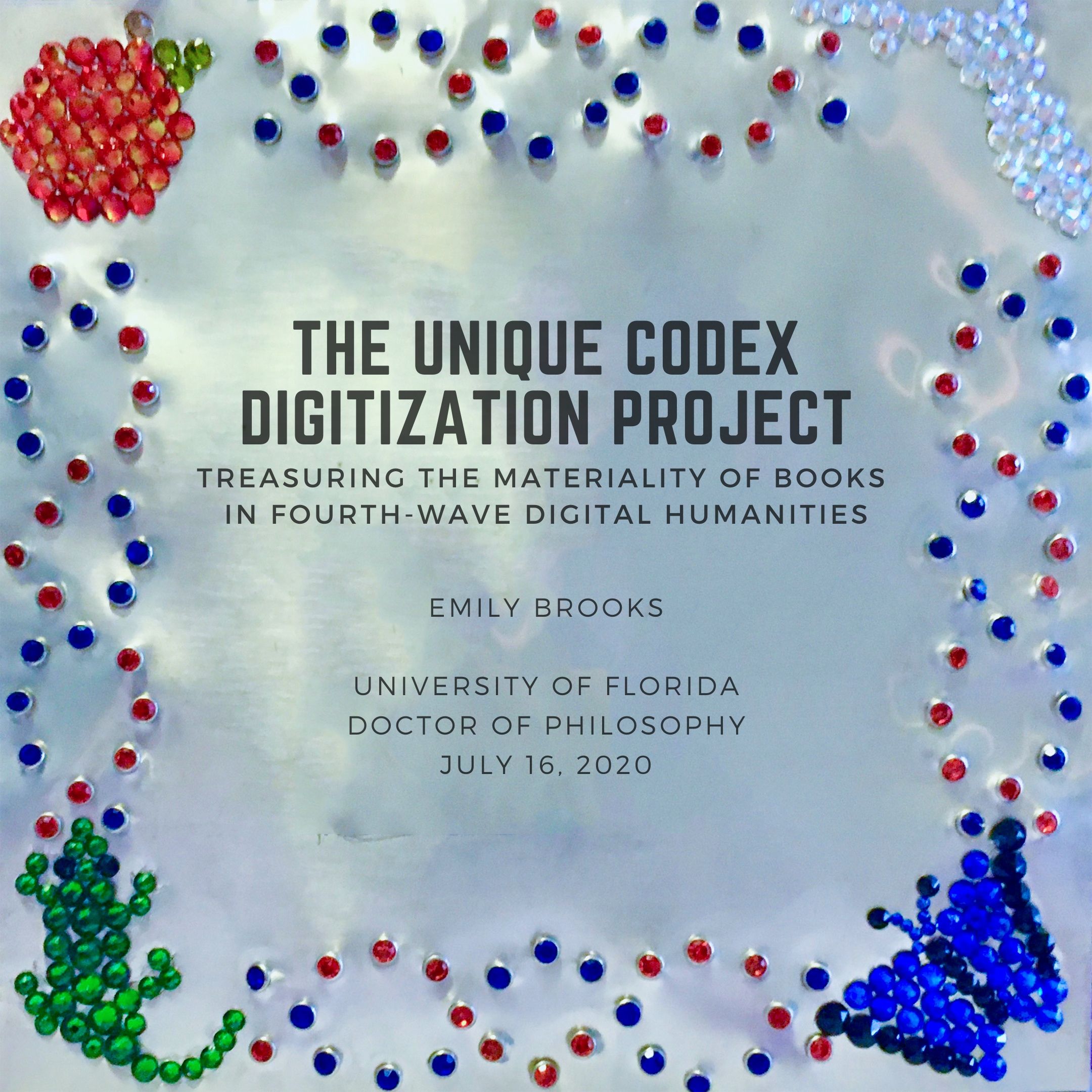
Dr. Emily Faith Brooks [Graduation]
I graduated from the University of Florida with a PhD in English and a graduate certificate in digital humanities in August 2020. I defended my dissertation, "The Unique Codex Digitization Project: Treasuring the Materiality of Books in Fourth-Wave Digital Humanities," on July 16, 2020. The title is a pangram, meaning it contains every letter in the alphabet.
Many Thanks To My Committee
Chair: Dr. Sidney Dobrin
Dr. Terry Harpold
Dr. Anastasia Ulanowicz
Dr. Elizabeth Dale
English.ufl.edu [Webmaster]
I run UF's English department website via WordPress, maintaining forms, pages, event calendars, posts, newsletters, and more. Check out the site, english.ufl.edu
Spring 2020
English.ufl.edu [Webmaster]
I run UF's English department website via WordPress, maintaining forms, pages, event calendars, posts, newsletters, and more. Check out the site, english.ufl.edu
Fall 2019
ENC1136: Multimodal Writing & Digital Literacy: Creativity + Technology = Magic [Instructor]
Multimodal writing is writing through multiple modes: images, text, video, etc. We encounter multimodal writing daily on many social media sites, from hyperlinks, images, captions, videos, etc. Multimodal composition teaches digital literacy and digital creativity. This course teaches students to compose and circulate multimodal documents in order to convey creative, well- researched, carefully crafted, and attentively written information through digital platforms and multimodal documents. This course promotes digital writing and research as central to academic, civic, and personal expression.
This course section will explore how a combination of creativity and technology allows us to create magic for others. Course assignments include a rhetorical analysis infographic, an image-text zine, a (transcribed) podcast episode, an accompanying video and website, and a final e-portfolio. Students will reflect on course viewings and readings via Tumblr. Check out our schedule at https://multimodalmagic.tumblr.com/schedule

2019 Leading Edge Libraries Conference [Invited Presenter]
Recreating physicality through 3D printing for the humanities with Sara Gonzalez
English.ufl.edu [Webmaster]
I run UF's English department website via WordPress, maintaining forms, pages, event calendars, posts, newsletters, and more. Check out the site, english.ufl.edu
Summer 2019
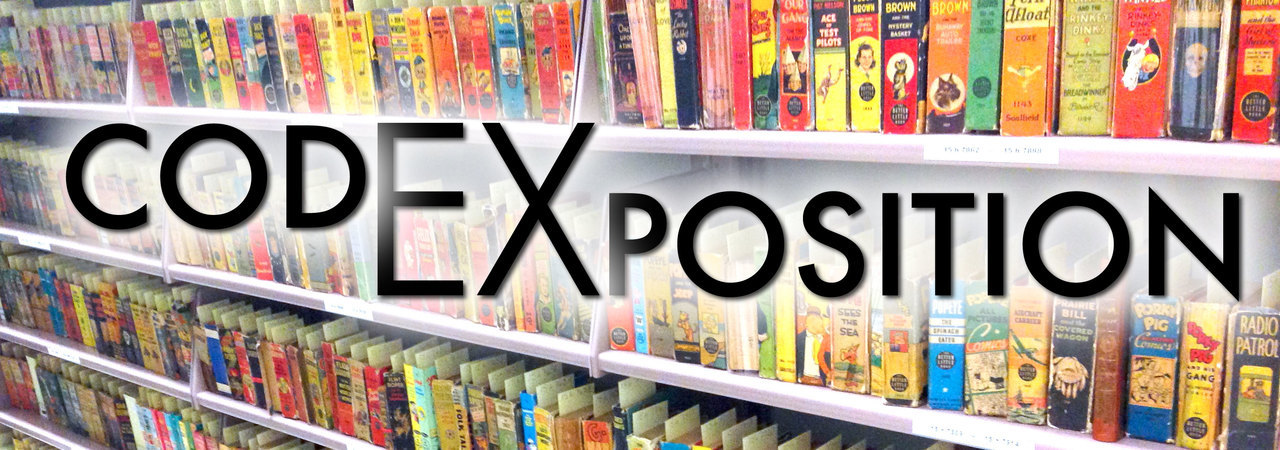
Society for the History of Authorship, Reading, and Publishing [Presenter]
On July 18th, I presented "Codexposition: Book History Pedagogical Interventions in the Composition Classroom" as part of the "Portmanteaued Permutations of Print, Play, and Pedagogy" panel.
English.ufl.edu [Webmaster]
I run UF's English department website via WordPress, maintaining forms, pages, event calendars, posts, newsletters, and more. Check out the site, english.ufl.edu
Spring 2019
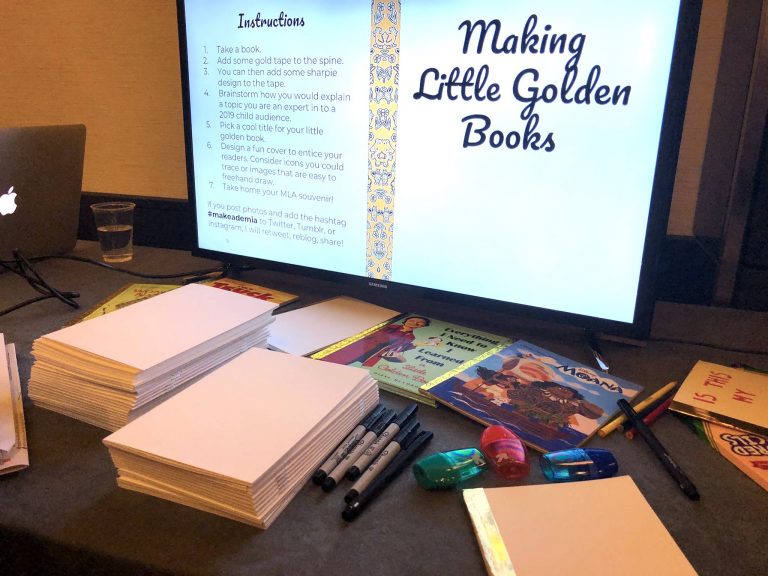
Modern Language Association [Presenter]
On January 3rd, I presented "Makeademia: Paper/Digital Prototyping as Multimodal Composition" as part of the "Scholarly Making: Pedagogy, Printing, Publics" panel. On January 5th, I participated in an interactive poster session, "Teaching Material Texts" with my presentation "Making Little Golden Books: A Material, Multimodal Approach to the Media History of Disney".
English.ufl.edu [Webmaster]
I run UF's English department website via WordPress, maintaining forms, pages, event calendars, posts, newsletters, and more. Check out the site, english.ufl.edu
Fall 2018
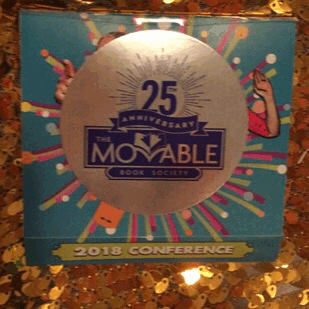
Movable Book Society Conference [Invited Speaker]
Have you ever wondered how movable books should be digitized? What methods are better for volvelles, what technologies work best for dissolving scenes, and what can you do with extravagant pop-ups? Come see the many ways that historical movable books can be shown online, from animated GIFs, to videos, to 3D models, to 4D volumetric captures! Emily Brooks will share her doctoral research from the Baldwin Library of Historical Children’s Literature and offer tips for digitizing your own movable books. Conference Agenda.
ENC3310: Advanced Exposition: Cod(ex)2position [Instructor]
We are already in the habit of daily verbal and textual exposition: describing observations, narrating events, providing instructions, linking causes to effects, comparing and contrasting ideas, illustrating our points of view, defining moments, classifying new experiences, and making connections. We generate these strings of characters, syllables, words to make something that has never quite existed in exactly that combination before—just as makers use the same toolboxes, technologies, or raw materials to make new, unique artifacts. How is writing, then, a form of making? In this course, we will explore how humanist scholars experiment, create, and make things through research.
This course will teach you how to enhance your writing style (clarity, coherence, cohesion, concision, and elegance) and design thinking habits (color, typography, layout, visuals, and medium). You will read a style handbook and select chapters and project snapshots from book history and maker culture. Based on the readings, you will make things like zines, animated GIFs, and 3D prints and write 6000 words as blog posts and various expository exercises.
Summer 2018
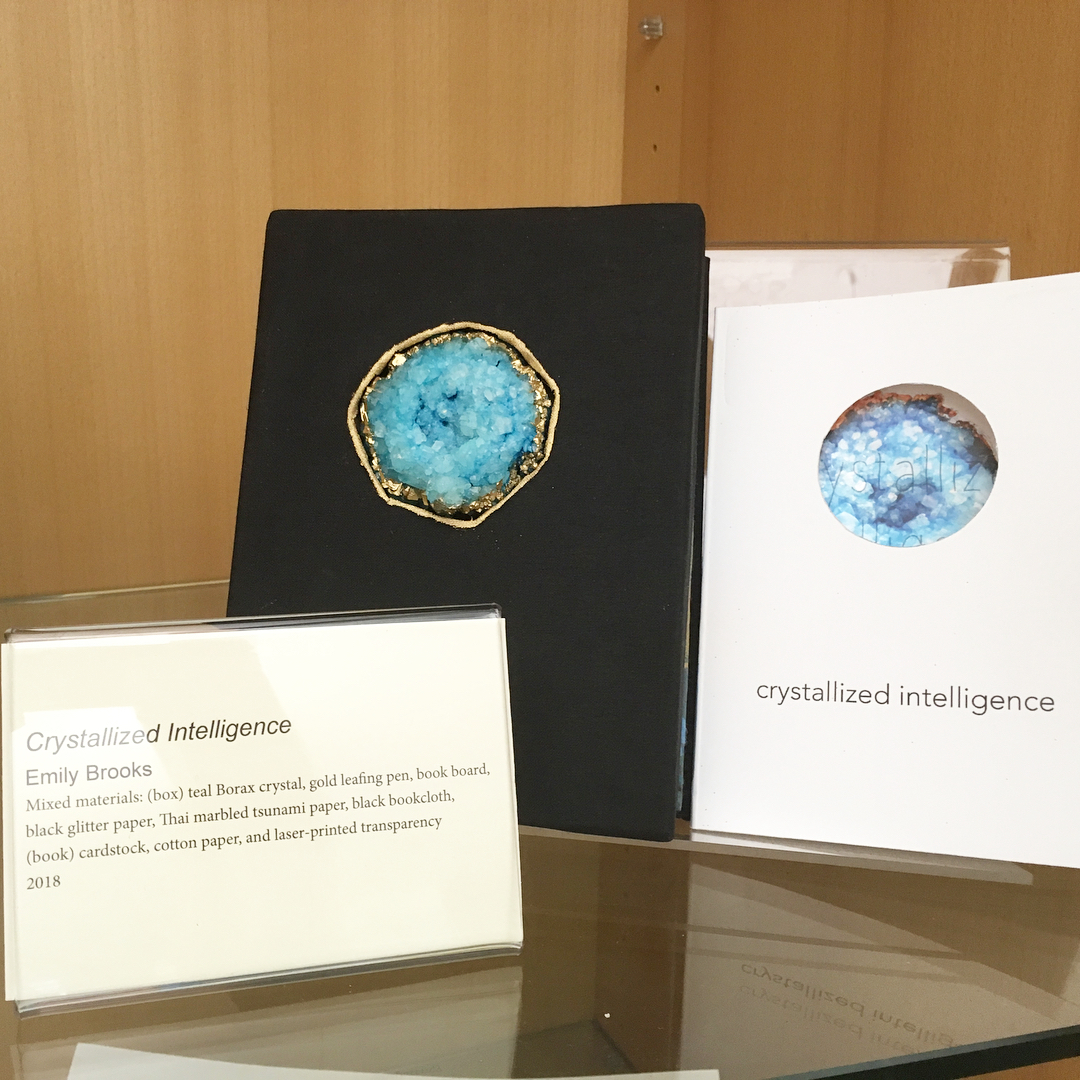
NEH Summer Institute - The Book: Material Histories and Digital Futures [Summer Scholar]
My final project, Crystallized Intelligence, is on display at the Salt Lake Public Library. It is a selective academic memoir of my favorite courses at the University of Florida. Each page spread encapsulates some of the most memorable concepts learned in an assemblage of notes, quotes, diagrams, etc. The book is meant to represent my crystallized knowledge, an educational psychology concept in contrast with fluid intelligence. The handmade case is made with Tsunami marbled paper, black glitter paper, black bookcloth, and a crystal I made with Borax. The book is made with cotton paper, transparencies, and is a perfect binding. If you're interested in reading the pages, check out this PDF.
On March 28, I was notified of my selection as one of 25 summer scholars. We were evaluated based on an application essay and CV. The institute is from June 18-July 13 hosted by Salt Lake Community College. Week 1: Materiality & The History of the Book Form will feature Nicole Howard and Johanna Drucker; Week 2: Circulation & the Social Patterns of the Book will feature Jonathan Senchyne; Week 3: Embodied Perspectives will feature Mara Mills; and Week 4: Alterations and Experimentations in Book History will feature Anna Arnar. A huge thanks to Lisa Bickmore, Melissa Helquist, and Charlotte Howe for organizing this amazing opportunity! You can check out the institute website for more details.
ENC3310: Advanced Exposition: Makeademia [Instructor]
We are already in the habit of daily verbal and textual exposition: describing observations, narrating events, providing instructions, linking causes to effects, comparing and contrasting ideas, illustrating our points of view, defining moments, classifying new experiences, and making connections. We generate these strings of characters, syllables, words to make something that has never quite existed in exactly that combination before—just as makers use the same toolboxes, technologies, or raw materials to make new, unique artifacts. How is writing, then, a form of making? In this course, we will explore how humanist scholars experiment, create, and make things through research.
This course will teach you how to enhance your writing style (clarity, coherence, cohesion, concision, and elegance) and design thinking habits (color, typography, layout, visuals, and medium). You will read a style handbook and select chapters and project snapshots from Making Things and Drawing Boundaries: Experiments in the Digital Humanities. Based on the readings, you will make things like zines, animated GIFs, and 3D prints and write 6000 words as blog posts and various expository exercises.
Spring 2018
English Department Graduate Student Teaching Award [Recipient]
On January 25, I was notified of my selection as one of eight award winners. We were evaluated based on a class observation, submitting course materials including syllabus and assignment descriptions, and graded student assignments. You can check out some amazing student projects from my Writing Through Media: Disney Then and Now course from fall.
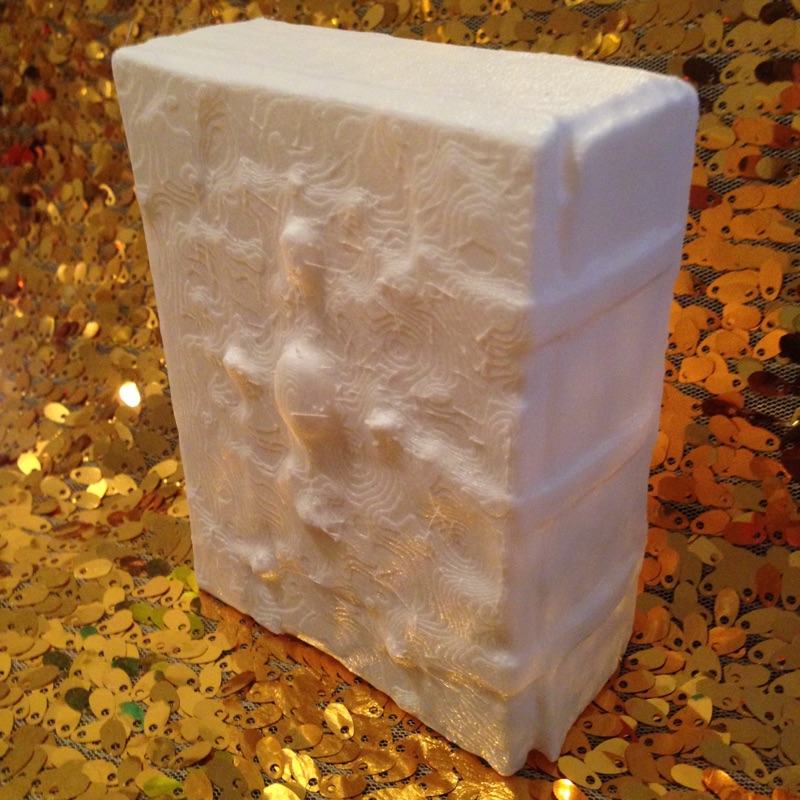
Modern Language Association [Presenter]
On January 5, I presented Re(p)lic(a): Making 3D-prints of treasure bindings to explore historic bookmaking practices."
ENC3312: Advanced Argumentative Writing: Making Media Meta [Instructor]
In 1964, Marshall McLuhan declared, “The medium is the message.” Over 50 years later, this argument remains one of the founding principles of media studies. In this course, we will consider how arguments are crafted across the humanities. This course teaches students how to compose advanced arguments through an in-depth understanding of rhetorical persuasion (logos, ethos, pathos, telos, and kairos); a mastery of writing style (clarity, coherence, cohesion, concision, and elegance); and a command of design (color, typography, layout, visuals, and medium). We will first analyze exemplary arguments. Students will then determine best practices and apply their newly-gained knowledge to assignments considering these forms: rhetorical analysis, definition, evaluation, and proposal. Students must demonstrate their skills in research, organization, and design. For the final project, students will create a meta argument about their chosen material/medium, which might be a podcast, puppet show, pop-up book, board game, or choose-your-own-adventure.
Fall 2017
UF English Candidacy Exams [PhD Candidate]
On August 18, I presented my dissertation prospectus and passed my exams. Check out my research interests and reading list.
ENG1131: Writing Through Media: Disney Then and Now [Instructor]
What started off as a small studio venture between two brothers, Disney is now the second largest media conglomerate in the world. Ranging from production to distribution, many of us encounter Disney entertainment in some way on a daily basis. Disney, therefore, provides many relatable examples of the media shift we have seen in the 21st century. In this course, we learned how to analyze media, adapt rhetorical strategies to the process of writing about media through media, consider how media plays a role in our everyday lives and how media reflects and shapes our understanding of the world, and apply creativity and knowledge to make new media.
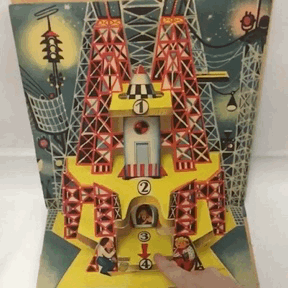
Baldwin Library of Historical Children's Literature Toy and Movable Books Intern [Intern]
During this internship, I searched the metatags Toy and Movable Books and Toy and Movable Books-Specimens, created a spreadsheet identifying types of movability, selected and prepared 15 items for digitization, and scanned the books to create animated GIFs. More information about this grant can be found here.
Summer 2017
Digital Humanities and Design Symposium [Participant]
From May 4-5, I attended the DH+Design symposium hosted by The Digital Integrative Liberal Arts Center (DILAC) at Georgia Tech. Read my reflections at my HASTAC blog post.
Gator Computing Camp Arduino Workshop [Instructor]
On June 6, I taught 24 high schoolers how to create a paper animatronic with Arduinos, servo motors, and a joystick. Watch a short video here.
Society for the History of Authorship, Reading, and Publishing Conference 2017 [Presenter]
On June 12, I presented my paper, "Volumetric Captures: Digitizing Spatial and Temporal Shifts of Movable Books."
Children's Literature Association Conference 2017 [Presenter]
On June 22, Rebekah Fitzsimmons, Poushali Bhadhury, Kristen Gregory, and I presented our panel, "Digital Futures of Analog Histories: Data Mining, Digitization, and Digital Pedagogy in the Baldwin Library of Historical Children's Literature."
Science Quest Camp Arduino Workshop [Instructor]
On July 10, Shannon Butts and I taught 24 high schoolers how to create a paper animatronic with Arduinos, servo motors, and a joystick.
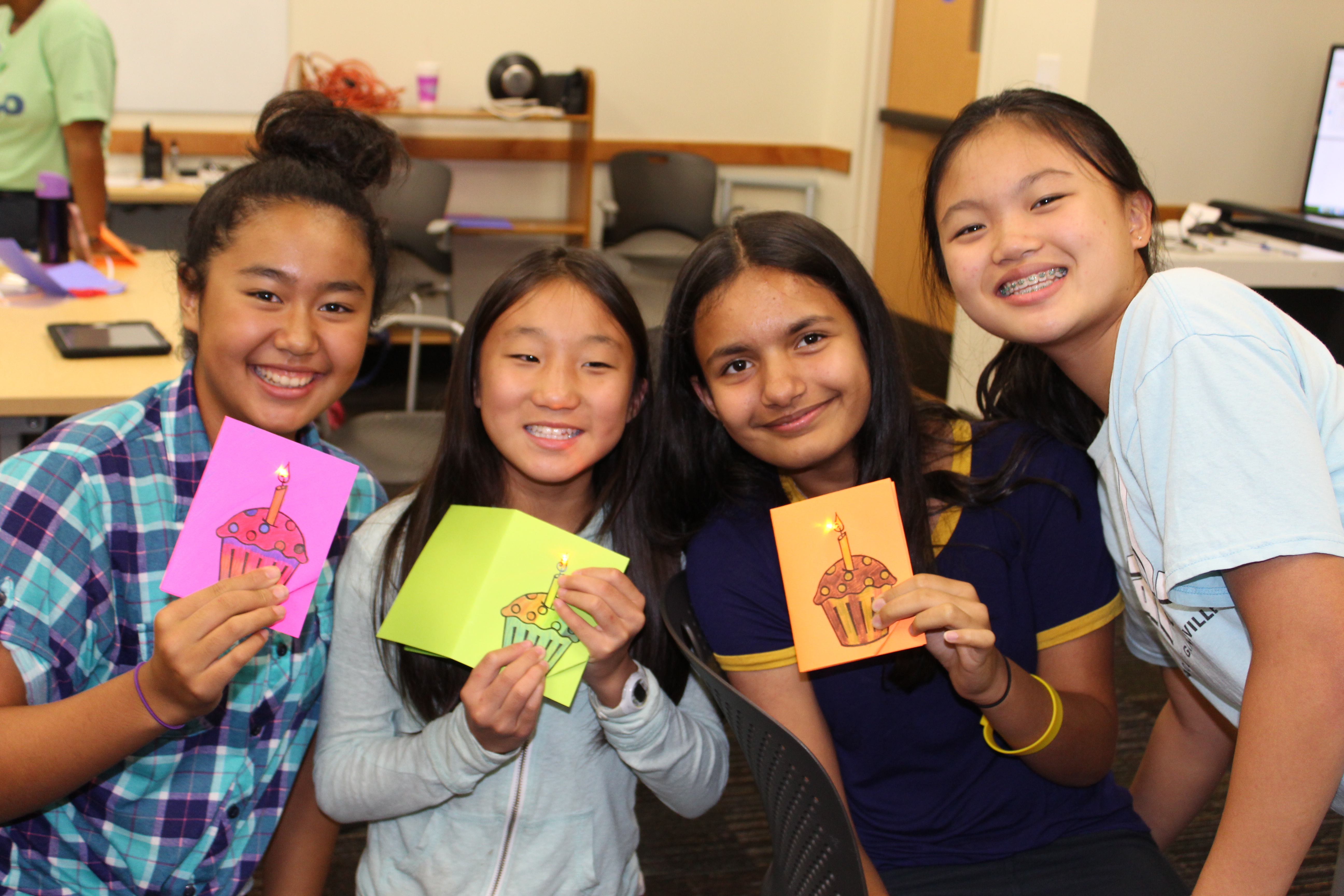
Girls Tech Camp Crafting With Technology [Instructor]
On July 20, I taught 22 middle school girls how to create simple circuits at Girls Tech Camp sponsored by the Marston Science Library. Campers learned how to connect their knowledge of electron shells and the periodic table of elements to how batteries work, how to create simple circuits using copper tape, coin cell batteries, and LEDs, and to turn their light on and off by opening or closing the circuit.
Marston Science Library Intern of Emerging Technologies [Intern]
During this internship, I created guides for students to learn how to use the available resources at the Marston Science Library, including Printrbot Play 3D printers, Structure Sensor 3D scanners, Arduino kits. More information about this grant can be found here.
Spring 2017
Modern Language Association [Presenter]
On January 6, I presented "Pat, Press, and Spot: Translating Tactility between Traditional and Technological Books."
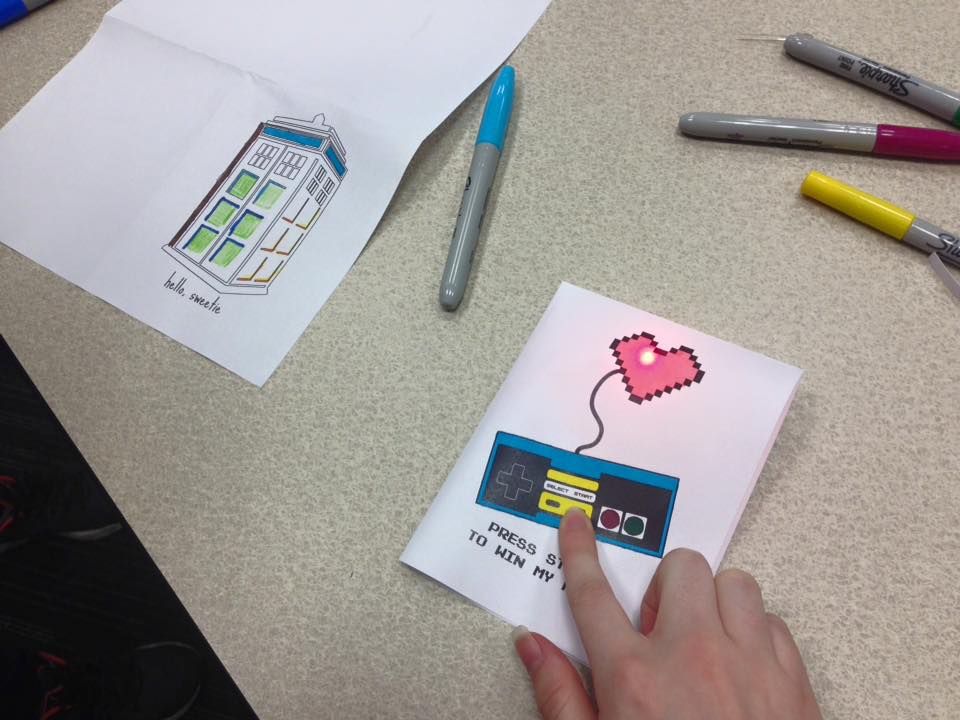
Paper Circuit Greeting Card Training [Instructor]
On February 14, Shannon Butts and I led a pop-up workshop sponsored by the Marston Science Library. Participants learned to create simple circuits using copper tape, coin cell batteries, and LEDs and took home the cards they made.
Morse Code Arduino Training [Instructor]
On February 22, Shannon Butts and I led the intermediate Morse code Arduino training sponsored by the Marston Science Library. Participants quickly learned about Morse code, to prototype using the Arduino and breadboard, to read code, use pre-existing and write new functions, and to use the Serial Monitor to send a coded message with the LED and piezo.
THATCamp Gainesville [Keynote Presenter]
THATCamp Gainesville 2017 was held on Saturday, April 21st at the Harn Museum of Art. Shannon Butts and I led the flipped keynote on teaching participants to use the Aurasma augmented reality app, and challenged participants to make the augmentations publicly available to inform, illuminate, and inspire future visitors to the site, to spark critical discussions of art, and to promote public humanities.
To read our session proposal, please visit http://gainesville2017.thatcamp.org/2017/04/17/augmenting-art-with-aurasma/
Fall 2016
AML2410: Disneyfication (Issues in American Literature and Culture) [Instructor]
During and after Walt Disney's lifetime, the studio made several adaptations (animated and otherwise) of historical and contemporary literature and events. In this course, we explored how these works and events as well as their Disneyfied adaptations shaped a nation at crucial moments in history. We also explored how Disney radically influenced major industries like animated films, television, and theme parks and changed the notions of copyright forever.
Paper Animatronic Arduino Training [Instructor]
On November 14 and 17, Shannon Butts and I led the beginning paper animatronic Arduino trainings sponsored by the Marston Science Library. Participants learned to power circuits, to prototype using the Arduino and breadboard, to read code, and to control their paper animatronic with two micro servo motors and a joystick.
Summer 2016
Digital Humanities Summer Institute: Physical Computing and Desktop Fabrication [Student]
From June 13-17, our class learned about prototyping with Arduinos, 3D modeling with Autodesk's 123D Design, 3D scanning with photogrammetry, fabricating in slices with 123D Make, and documenting using GitHub.
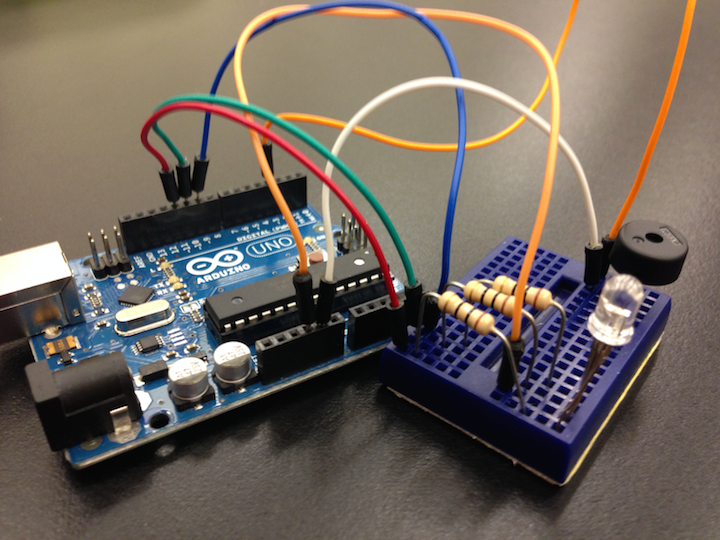
Digital Humanities Summer Institute Colloquium [Presenter]
On June 15, I presented, "The Digitization and Dissemination of Movable Books Data."
Children's Literature Association Conference 2016 [Presenter]
On June 9, Casey Wilson, Rebecca McNulty, and I presented our panel, "Girls Will Be Boys: Cross-Dressing in Young Adult Literature."
Marston Science Library Girls Technology Camp 2016 [Instructor]
On July 28, Sara Gonzalez, Shannon Butts, and I taught Crafting with Technology. http://guides.uflib.ufl.edu/girlstechcamp
Spring 2016
HUM 6836: Digital Humanities Graduate Studio [Student]
In this course, we explored the impact of digital humanities in various fields like English, History, Anthropology, Musicology, and Art + Technology, and shared research in progress.
Pseudo Theremin Arduino Training [Instructor]
On April 13 and 14, Aaron Beveridge, Shannon Butts, and I led the beginning pseudo theremin Arduino trainings sponsored by the Marston Science Library. Participants quickly learned to identify different sensors, to prototype using the Arduino and breadboard, to read code, and to make "music" with the photocell and piezo.
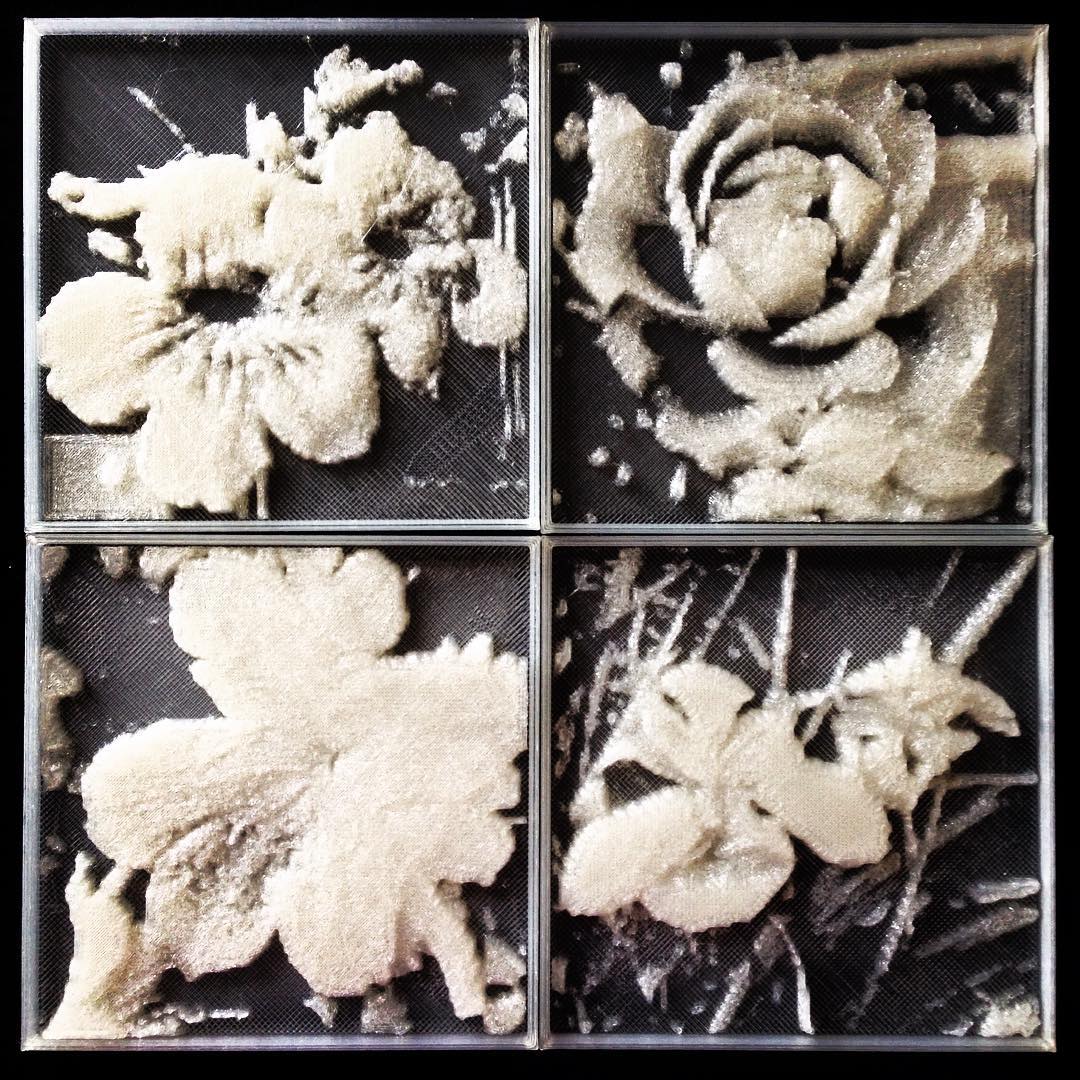
Harn Museum Access Art Touch Tours [Artist]
On March 12, 2016, my 3D printed lithophanes were on display at the Harn Museum of Art in Gainesville, FL.
Featured on Twitter.
Want to know more about the exhibit?
See more by following me on Thingiverse.
THATCamp Gainesville [Presenter]
THATCamp Gainesville 2016 was held on Saturday, April 23rd at Santa FE CIED. Shannon Butts and I led a session on low-tech public humanities, making mini-zines about making in the humanities to leave around Gainesville.
To read our session proposal, please visit http://gainesville2016.thatcamp.org/2016/04/23/low-tech-public-humanities/
Featured on Twitter.
If you're interested in learning more about this awesome unconference, you will want to visit http://gainesville2016.thatcamp.org/
Fall 2015
AML 2070: Survey of American Children's Fantasy Literature [Instructor]
In this course, we examined the impact of American children's fantasy authors like L. Frank Baum, Dr. Seuss, Shel Silverstein on the genre and studied the visual rhetoric of illustrated and picture books.
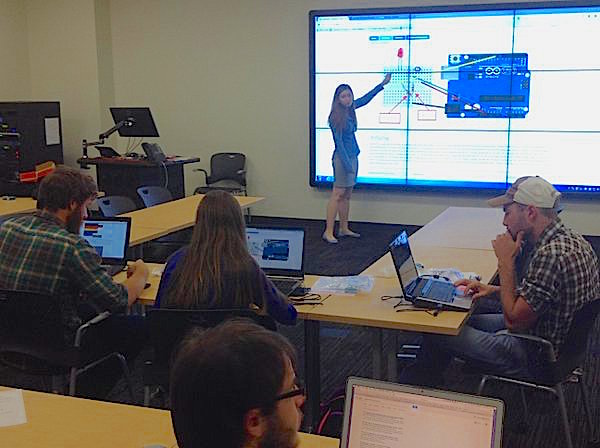
Piezo Arduino Training [Instructor]
On November 3 and 5, Aaron Beveridge and I led the beginning piezo Arduino trainings sponsored by the Marston Science Library. Participants quickly learned to identify different sensors, to prototype using the Arduino and breadboard, to read code, and to make "music" with the piezos.
South Atlantic Modern Language Association [Presenter]
On November 13, I presented, "The heART of the LAM: Cultural Heritage Preservation with 3D Technology."
Spring 2015
ENG 1131: Writing Through Media: The History (and Future) of the Book [Instructor]
In this course, we read and discussed concepts found in excerpts from The Book History Reader, visited Special Collections, learned to make different book forms, and envisioned what the future of books might look like.
ENC 6428: Data Mining and Digital Poetics [Student]
In this course, I collaborated with Computer Science and English colleagues to create an interactive endless maze. Using data mining, we pulled terms from the William Blake Archive which were then used to generate the walls of the maze, as well as prints as textures.
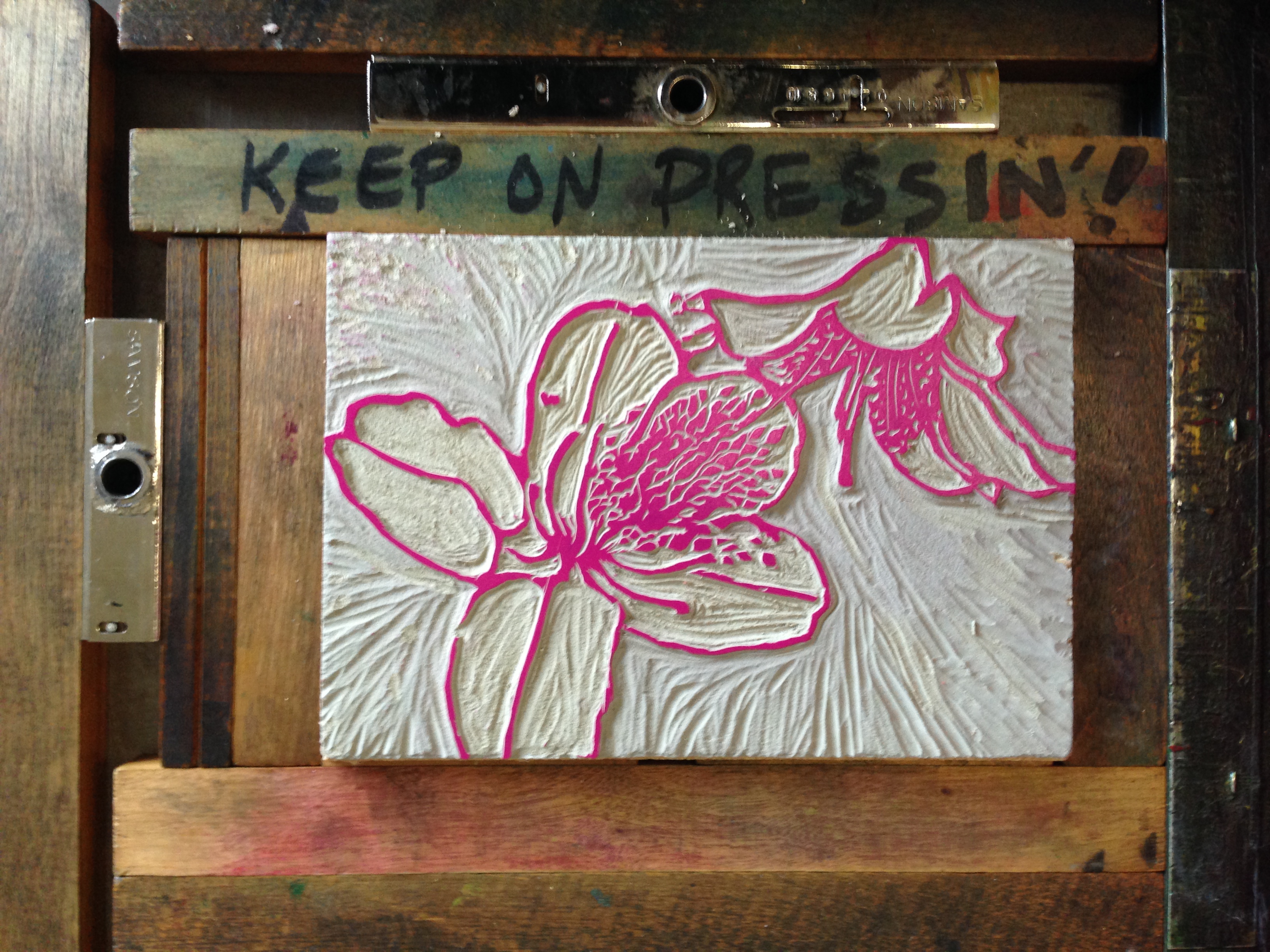
ART 5930C: Letterpress [Student]
In this course, I learned how to set type, design photopolymer plates, and use a Vandercook letterpress to design cards, prints, and macaron pop covers.
Photocell Arduino Training [Instructor]
On April 1 and 2, Aaron Beveridge and I led the beginning photocell Arduino trainings sponsored by the Marston Science Library. Participants quickly learned to identify different sensors, to prototype using the Arduino and breadboard, to read code, and to make a light that shines in low-light conditions.
Edible Book Contest [Artist]
On April 7, I entered my "Cookie Monster Book of Cookie Monsters" playing on Harry Potter's Monster Book of Monsters and Sesame Street's Cookie Monster to make an edible book made out of chocolate chip cookie cake and icing. For more information, view this PDF.